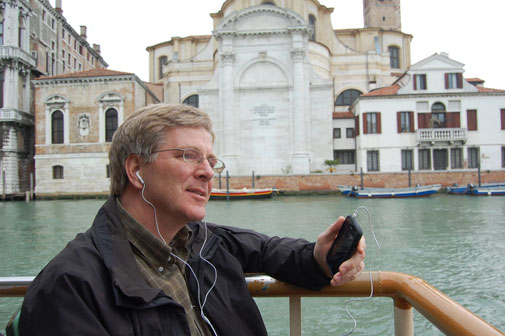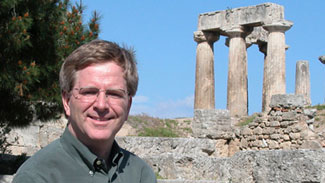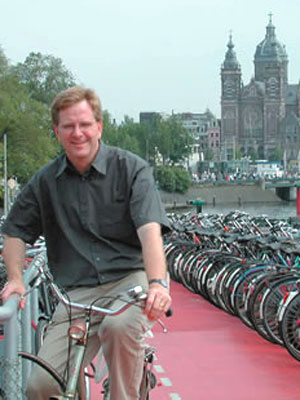
Would you suspect something was wrong if you turned on the PBS Newshour one evening and, instead of getting an intelligent dose of the day's news by the program's current on-air team, you saw Robert MacNeil and Jim Lehrer on the screen, talking about Iraq's recent invasion of Kuwait?
Or if you opened your favorite travel magazine and saw a lead story about the imminent opening of Walt Disney World in Florida?
We go to archives and libraries for that kind of history. We go to journalists for current information.
So it's sort of strange that public television continues to show older episodes by one of today's best journalist-travel writers, Rick Steves, containing observations about a country's social, financial, political and other aspects. Because Steves' programs report, rather than simply photograph, they are like his best-selling guidebooks: When produced, they give real and armchair travelers an excellent guide to what to expect, what to see and where to go in a country.
Problem is, travel guidebooks are regularly updated. Travel TV shows are not...

There are some Steves TV episodes on the air that stretch back to the '90s. And in a world severely affected by terrorism and economic recession, what was true and helpful, even in the earlier parts of this century, aren't necessarily even close to accurate now.
So if, for example, you hear Steves say that currently hard-luck Ireland is a booming Celtic Tiger, or almost-destitute Greece is a jewel in the EU crown, you may or may not know the information is dated and wrong.
And before you label this as a tempest in a teapot, ask about the lesser-known inaccuracies. Can you still stow your luggage in a train-station locker while you roam the town, suitcase-free? Can you still assume Sicily still is growing and modernizing because the richer Italian regions to the north are shoveling funds its way?
It's natural to suspect the accuracy of almost all information, when some that's knowingly wrong swims in the same pool.
Attempts to ask Steves about whether this was an issue for him were unsuccessful.
"Thanks for your interest in our work. I appreciate your comments. But we are so over-committed right now that we'll have to give your interview a pass," he wrote in a recent email.
Requests for insight from public-television executives were turned down. Others in the business (who spoke on condition they wouldn't be named) acknowledged the possible conflict, but pointed out it would be cost-prohibitive to add video advisories to the start and/or end of each program, noting that information in the program may be dated. And pulling the popular episodes isn't being considered.

The Society of American Travel Writers (SATW), of which Steves' company is a member, was queried about the dilemma of keeping information accurate in a financially tenuous economy. Its president, Betsa Marsh, wrote the following in response:
"The reality of travel content -- web, print or broadcast -- is that its strongest influence, as with all journalism, is the current moment. We know any travel and tourism feature may have a short shelf life and may suddenly be overtaken by events.
"It's also important to know SATW members -- 1,200 travel writers, photographers and public relations professionals -- chiefly portray the history, culture, attractions, and people of global sites. SATW was founded in 1955, and as an association we have our own ever-evolving history, just like the sites, monuments, and travel industry our members cover worldwide. Our members create mobile apps, websites, blogs, and use social media. In all these media, our members work hard to give current and timeless value to the travel information.
"As we travel the world, we're also aware events may alter the pieces we're working on, so as travel professionals we strive to anticipate industry and consumer trends. Like all memorable journalism, good travel writing captures the moment while withstanding the vagaries of time and technological change."
Public TV executives contacted for this story pointed out Steves' author blogs, newspaper columns and other materials that convey current information, unlike some of the television programs. Two of them separately advised to use the television shows as a general knowledge base, but check the information against the more-current guidebooks, newsletters and other more malleable materials.
In other words, if you enjoy the pictures but don't allow the words to take root in your mind, there's really not an issue. That does not seem to be the type of advisory most journalists would want attached to their work. Yet, unwieldy as that practice might be, it does alleviate the worry factor.
So long, that is, as you don't make the TV your last stop before embarking.